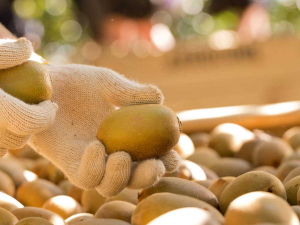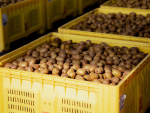Zespri is looking at increasing its cool store space - both in New Zealand and overseas - as a consequence of shipping problems caused by Covid-19.
The company's chief global supply officer, Alistair Hulbert, told Hort News that with 700 more hectares of Sun-Gold being licensed in the past three years, there is a need to have special cool storage facilities available to handle this extra fruit and to cope with shipping disruptions.
He says as well as building new facilities in NZ, Zespri plans to lease more cool storage space in some of its key markets - such China, Japan and Europe.
Even now, cool storage space in NZ can be tight at the peak of the season and that is why Zespri has chartered ships so it can move product on schedule.
"Another reason for increasing our cool store capacity overseas is that there has definitely been a shift to more online sales last year in markets," Hulbert explains.
"So, that means we need to have more fruit available in cool stores in these markets. We send our fruit to a distributor who puts it into consumer as opposed to the fruit being sold through a retailer. It also helps us build our brand presence."
Hulbert says there are very strict protocols around when kiwifruit can be harvested - such as dry matter and taste - and the fruit needs to get to market in perfect condition to capture the top dollar. He adds that there are particular challenges with the new red variety, which has only eight weeks from harvest to consumer.
"The one thing that is happening in all our packing facilities at the moment is temperature checking," Hulbert told Hort News. "We are observing all the hygiene standards we have in place. We are an industry that lives on our brand and food safety and the integrity of our product and we have always had very stringent standards, so lifting those standards is not new to us."
He adds that Covid-19 has seen some countries, notably China, impose new standards on imports. Both Chilean cherries and Argentinian beef have been caught in this regard and NZ is now faced with having to disinfect every pallet of kiwifruit before it can clear customs in Chinese ports.
But Hulbert is somewhat philosophical about this saying Zespri does have logistics staff in markets and they work with MPI and officials in other countries to sort out any problems that may arise.
"We have got to be nimble and react quickly and we have got to try and anticipate what might happen," he says.


















